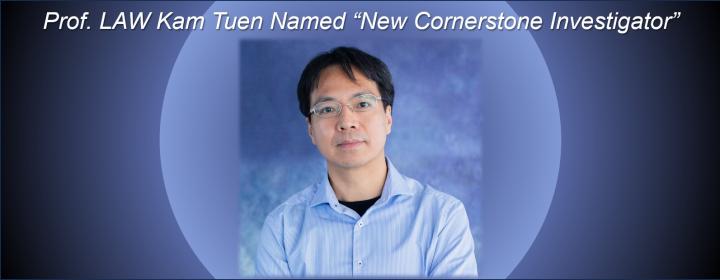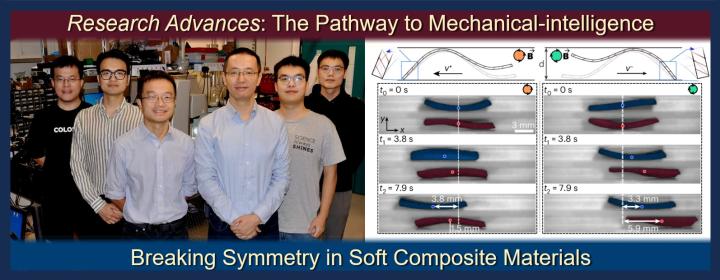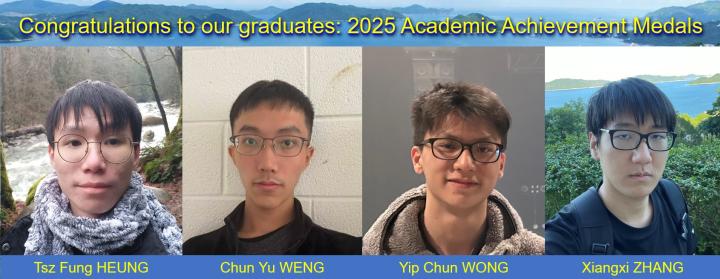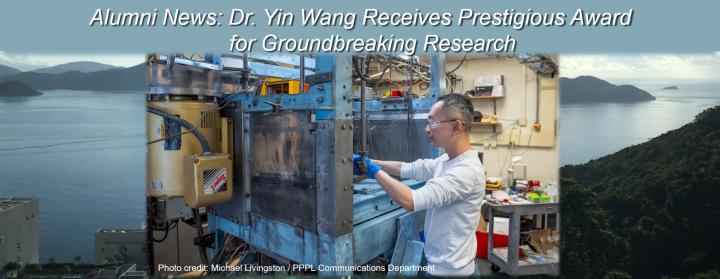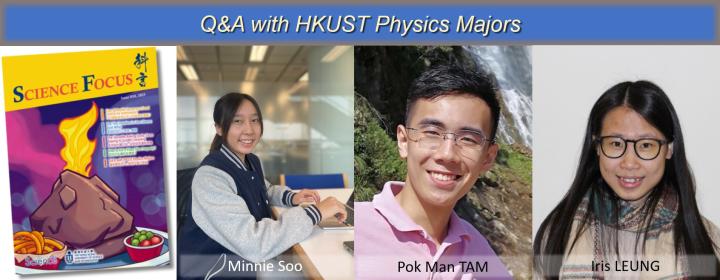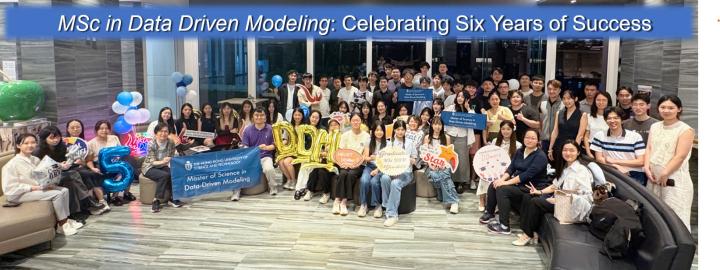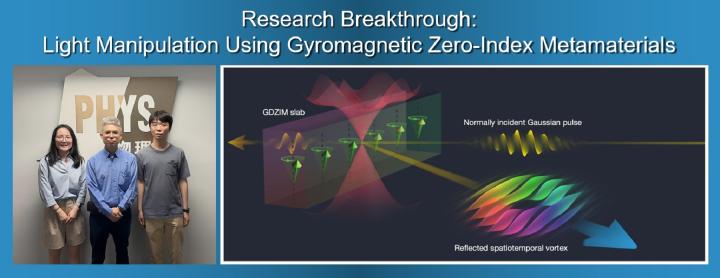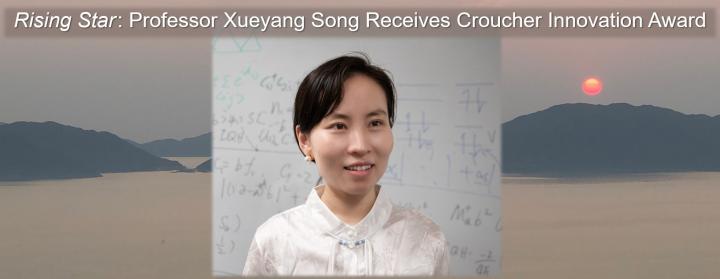News & Events
2025-12-05
The Department of Physics is pleased to announce the winner of the 2025 Paul and May Chu Undergraduate Research Award. The Paul and May Chu Undergraduate Research Award (Honorable Mention) is awarded to Junjie PENG.
Paul and May Chu Undergraduate Research Award, Honorable Mention – Junjie PENG
“For construction of realistic tight-binding models for layered materials V2X2O-family and symmetry analysis of spin transport and MOKE in altermagnets” under the supervision of Prof. Junwei Liu.
Junjie Peng has conducted focused research in condensed matter physics since joining Prof. Junwei Liu’s group. He independently derived efficient tight-binding models for layered V₂X₂O-family altermagnets to capture their unconventional response properties, performed systematic symmetry analysis to predict novel spin conductivity, and investigated the magneto-optical Kerr effect (MOKE) as a reliable optical fingerprint for detecting altermagnetic order. His discovery will facilitate future studies of altermagnetism and its application in spintronics.
Read more
2025-12-01
The HKUST Department of Physics is proud to announce that Chair Prof. LAW Kam Tuen of the Department of Physics has been named a “New Cornerstone Investigator“ by the Tencent-funded New Cornerstone Science Foundation. Prof. Law is among 35 distinguished scientists selected this year from across the nation and the sole honoree from Hong Kong.
University Press Releases:
HKUST Prof. LAW Kam-Tuen Named “New Cornerstone Investigator” – Hong Kong’s Only Honoree this Year
科大羅錦團教授獲選「新基石研究員」 成為本年度香港地區唯一獲選者
科大罗锦团教授获选「新基石研究员」 成为本年度香港地区唯一获选者
Read more
2025-11-28
Interdisciplinary research team members from the HKUST Department of Physics (PHYS) and the HKUST Department of Mechanical and Aerospace Engineering (MAE), from left to right: Dr. Yiqiu Zhao (PHYS), Dr. Shuaihu Wang (PHYS), Prof. Wenqi Hu (MAE), Prof. Qin Xu (PHYS), Mr. Chang Xu (PHYS), and Mr. Hong Wang (MAE).
Publication:
Mechanical non-reciprocity programmed by shear jamming in soft composite solids
University Press Releases:
HKUST Researchers Pioneer Pathway to Mechanical Intelligence by Breaking Symmetry in Soft Composite Materials
科大研究團隊打破柔性複合材料的力學對稱性 開創機械智能新方向
科大研究团队打破柔性复合材料的力学对称性 开创机械智能新方向
Read more
2025-11-21
Congratulations to Tsz Fung Heung, Chun Yu Weng, Yip Chun Wong, and Xiangxi Zhang (l-r) for being awarded 2025 Academic Achievement Medals. The Academic Achievement Medal is the highest academic honor bestowed by the University on outstanding undergraduate students upon graduation. The awarding of the Medal was established in 1994 to recognize graduates whose outstanding academic achievements bring honor and distinction both to themselves and to the University. Only the top 1% of graduates are awarded the Academic Achievement Medal annually. These awards will be presented at the 33rd University Congregation on 29 November 2025. The Department is very proud of all graduates and additionally delighted in the achievements of the Academic Achievement Medal awardees.
Tsz Fung Heung is currently pursuing a Ph.D. in the Department of Physics at Northwestern University with an interest in quantum information. Chun Yu Weng is pursuing his interest in experimental condensed matter physics as a Ph.D. student in the Department of Physics at Cornell University. Yip Chun Wong is a Ph.D. student in the Department of Physics at the University of Toronto. His interest is in theoretical condensed matter physics. Xiangxi Zhang is pursuing an M.Phil. degree in the Department of Physics at HKUST with a focus on theoretical condensed matter physics.
Read more
2025-10-30
The Department of Physics at HKUST proudly announces that alumnus Dr. Yin Wang, who earned his PhD in 2018 under the supervision of Professor Penger Tong, has been awarded the 2025 John Dawson Award for Excellence in Plasma Physics Research by the American Physical Society. Dr. Wang, currently a Staff Research Physicist at the Princeton Plasma Physics Laboratory (PPPL) — a U.S. Department of Energy national laboratory managed by Princeton University, achieved a significant milestone by successfully confirming the magnetorotational instability (MRI) in a laboratory setting using liquid-metal flows. The MRI is widely believed to be the driving mechanism behind the evolution of accretion disks, which destabilize orbiting material and cause it to spiral inward toward central objects such as black holes or young stars. This groundbreaking work made by Dr. Wang and coworkers at PPPL not only validates a long-hypothesized theory but also enhances our understanding of astrophysical phenomena such as black hole accretion and star formation. Dr. Wang credits his rigorous training at HKUST for shaping his scientific approach and contributing to his research success. Congratulations to Dr. Wang for this remarkable achievement!
Read more
2025-10-23
In the most recent issue of Science Focus, an HKUST physics major interviewed three other physics majors (one current and two alumni) about why they chose physics and how they feel about the career prospects for physics graduates.
The interviewer was Sam FAN, a physics undergraduate in year 4 who is currently doing a one-year internship with the Hong Kong Observatory. One interviewee was Minnie SOO, a year-4 physics major with an extended major in artificial intelligence. The others were two alumni: Dr. Pok Man TAM (BSc Physics 2018), now a postdoctoral fellow at Princeton University working on theoretical condensed matter physics; and Dr. Iris LEUNG (BSc Physics 2017), now a hedge-fund research engineer.
The interview topics include why they were inspired to major in physics, how their attitudes have changed over the years, their views on stereotypes about physics, and how they perceive the current job market for physics graduates. Read the full interview here.
Prospective physics students who would like to learn more about our undergraduate programs can find more information here.
Read more
2025-08-21
The HKUST Department of Physics is proud to announce the award of the Future Science Prize by the Future Science Prize Foundation to our colleague, Prof. Xi DAI, which he shared equally with Prof. Zhong FANG (Institute of Physics, Chinese Academy of Sciences) and Prof. Hong DING (Tsung-Dao Lee Institute, Shanghai Jiao Tong University),
“for their contributions to the computational prediction and experimental realization of topological electronic materials.”
University Press Releases:
HKUST Scholar Prof. DAI Xi Awarded 2025 Future Science Prize – China’s Nobel Equivalent
香港科大學者戴希教授問鼎有「中國諾貝爾獎」之稱的2025未來科學大獎
Future Science Prize:
https://www.futureprize.org/en/laureates/list.html
Read more
2025-08-20
Preamble
The HKUST MSc Program in Data-Driven Modeling (MSc(DDM)) is celebrating the graduation of its 6th cohort in 2025. Jointly offered by the Departments of Physics and Mathematics, the MSc(DDM) program aims at training students with science or engineering background for careers that require advanced modeling skills bolstered by strong problem-solving capabilities. The curriculum and program structure seamlessly integrate industry instructors and feature seminar speakers from diverse sectors to ensure a comprehensive learning experience aligned with the program's objectives.
The initial employment profiles of the first five cohorts of MSc(DDM) program reveal diverse career paths spanning industries, roles, and regions. Engineering attracted over 24% of alumni, followed by Data science/Algorithm and AI-related (21.5%), banking/finance (20.4%), Education/Government (6.8%) and Entrepreneurship (2.0%), while 14.7% pursued further advanced studies. Key roles of our graduates included software engineers, data scientists, and machine learning engineers, emphasizing a strong focus on technology-driven professions. Graduates secured positions at esteemed organisations such as Tencent, Bank of China, Ant Group, and multinational corporations like P&G and L’Oréal. These outcomes underscore the program's alignment with high-demand sectors, global employer recognition, and competitive remuneration, particularly in tech and financial hubs. The inclusion of entrepreneurial ventures and academic pursuits further showcases the diverse career paths available to graduates.
The program received highly positive evaluations during its first 5-year Program Review carried out under the authority of the University. The panel, led by Prof. Reimer Kühn from King’s College London, commended the program for its exceptional academic quality and well-structured framework. It also praised the program’s delivery, assessment methods, and unwavering commitment to excellence.
We also invited three alumni to share their reflections on the program after gaining work experience. Below are their comments.
Huang Yu
Yu belonged to the first batch of MSc(DDM) graduates in 2020. After graduation she started as an Algorithm Engineer in Huawei, Shanghai, and is now Compiler and Programming Language Engineer in the same corporation.
Recalling her MSc days, she treasured most the rich resources provided by the Program, including courses of various fields which broadened her horizon, and facilities such as the library. At the same time, she treasured her friendships with classmates, many of whom she still maintains relationships.
The knowledge and skills she learned in the MSc Program helped her in two aspects. She explained, “Firstly, during my job search, my acquired skills such as data structure and algorithms prepared me to pass written tests, and my experience in projects enriched my CV and enabled me to demonstrate my eligibility during interviews. Secondly, after assuming my first job, my MSc training on soft skills such as teamwork and group project management became highly relevant.”
For junior students of the MSc Program, she emphasized, “It is important to set their goals early. Which job sector are they targeting? Will they consider industry or PhD? This will help them to select suitable projects and internships. If they are unprepared, they may lose direction once they become busy with coursework.”
Hinz Shum
Hinz was also among the first cohort of MSc graduates in 2020. Following his graduation, he began his career as a Statistician responsible for international merchandise trade statistics and data science at the Census and Statistics Department of the Hong Kong Government before transitioning to his current role as a Data Scientist at the Hong Kong Monetary Authority. Hinz expressed great enthusiasm about implementing Generative AI in automating and enhancing various business functions, including but not limited to internal news surveillance frameworks and research processes.
Reflecting on his time in the MSc program, Hinz said, “I particularly valued the solid foundation it provided for my career development in data science, especially the hands-on experience in exploring diverse data sources and utilizing them effectively for informed decision-making. Moreover, the mock interview workshops offered by the program played a significant role in enhancing my job search success.” Beyond academics, Hinz greatly appreciated the networking opportunities with fellow alumni. Despite the pandemic forcing instruction online, their interactions on- and off-campus enabled him to remain updated on technological advancements and job market trends, ultimately facilitating his career advancement.
Among the skills acquired during the MSc program, data-driven programming stood out as the most impactful, yet he also emphasized significant growth in interpersonal abilities. Collaborating on group projects with classmates from diverse backgrounds enhanced his teamwork and leadership skills, which later enabled him to manage a team of 200 subordinates and lead different projects during his tenure with the government.
Hinz further expressed, “I encouraged incoming students to fully enjoy the program and actively engage in extracurricular activities and learning opportunities beyond the curriculum. With my current involvement in GenAI, I recommended students to deepen their knowledge in artificial intelligence, embrace its capabilities for problem-solving, and develop expertise in effectively prompting AI for optimal utilization.” Additionally, Hinz generously offered to conduct an expert workshop to share his experiences with current MSc students in February 2025, regarding practical applications and ethical use of GenAI.
Since Hinz’s graduation, the MSc Program has consistently strived to keep its curriculum aligned with cutting-edge developments
Bumki Son
After a few years of work, Bumki entered the MSc Program in part-time mode among the fourth cohort of MSc graduates in 2023 . He is now Director of the Research Department in the Singapore branch of Barclays Bank. Quantitatively analyzing GDPs, global trade, monetary and fiscal policies has been his regular job. Thus, his MSc training in data modeling, analysis, and prediction are highly relevant to his career.
Looking back on his days in the MSc Program, Bumki said, “I treasured most the opportunities to meet different people with different backgrounds and perspectives, especially fellow part-time students as we had similar working experiences. Nonetheless, I also treasured the friendship with fresh bachelor graduates, who were young and energetic.” After graduation, he maintained contact with his friends, exchanging views and supporting each other. Indeed, the background diversity of students entering this MSc Program provided a unique environment for meaningful interactions.
He found that the knowledge and skills he acquired in the Program are certainly helpful. Bumki elaborated, “For example, I need the skills to distinguish between noise and trend in financial data. Moreover, I need to quantify the impact of Korean martial law on market sentiment. This led me to consider how “soft data” affects “hard data”, how complex models can be reduced to simple models.” Indeed, these are skills practiced in the MSc Program, where students learn to start with the basics, then build models, and solve problems systematically.
To junior students entering the Program, he advised, “Enjoy the time, make friends with different people, and cultivate intellectual curiosity of how the learned skills can be used in future careers. Those who are proactive in exploring new frontiers benefit most.”
He also hoped that the MSc program could have more part-time students joining. According to him, part-time students have strong motivation to learn after a few years of job experience. Their learning span is normally two years, which enables them to learn progressively from basics to applications.
Read more
2025-06-13
Research team members from the Department of Physics, HKUST (from left to right): Dr. Ruoyanag ZHANG, Prof. Che-Ting CHAN, and Dr. Xiaohan CUI.
Publication:
Bulk-spatiotemporal vortex correspondence in gyromagnetic zero-index media
University Press Releases:
HKUST Scientists Achieve Breakthrough in Light Manipulation Using Gytomagnetic Zero-Index Metamaterials
Read more
2025-06-02
Congratulations to Assistant Professor Xueyang Song for being awarded the prestigious 2025 Croucher Tak Wah Mak Innovation Award 2025 by the Croucher Foundation in recognition of her groundbreaking research in theoretical condensed matter physics.
Established in 2012, the Croucher Innovation Awards aim to identify and provide substantial support to a small number of exceptionally talented “rising stars” in science and engineering disciplines at a formative stage of their careers. Recipients are selected or their distinguished doctoral and post-doctoral work, internationally competitive research achievements, and high-impact contributions to their field.
Prof. Song's research focuses on "decoding" quantum materials – substances with bizarre properties like superconductivity and the ability to make particles behave as fractions of themselves. Specializing in quantum materials like frustrated quantum magnets, fractional quantum Hall states, and exotic superconductors, Prof. Song investigates emergent phenomena such as fractionalization and gauge structures. Her research employs cutting-edge frameworks of symmetry, anomaly, and topology to decode physical properties and phase transitions in advanced materials, particularly in 2D systems (e.g., Moiré system). By combining formal theoretical tools, analytical models with computational simulations, she bridges fundamental physics with real-world applications, including energy-efficient materials and novel devices.
Prof. Song joined HKUST as an Assistant Professor of Physics in 2023. Her passion for physics emerged during high school, where she competed in the 14th Asian Physics Olympiad (APhO) and earned a gold medal. She pursued her undergraduate studies at Peking University, graduating with a Bachelor of Science degree, before advancing to Harvard University for her PhD in physics. Prior to joining HKUST as a faculty member, Prof. Song honed her research skills as a Moore postdoctoral fellow at the Massachusetts Institute of Technology (MIT).
Press Releases:
HKUST: Croucher Innovation Award 2025
Croucher Foundation: Innovation Awards 2025
Read more

